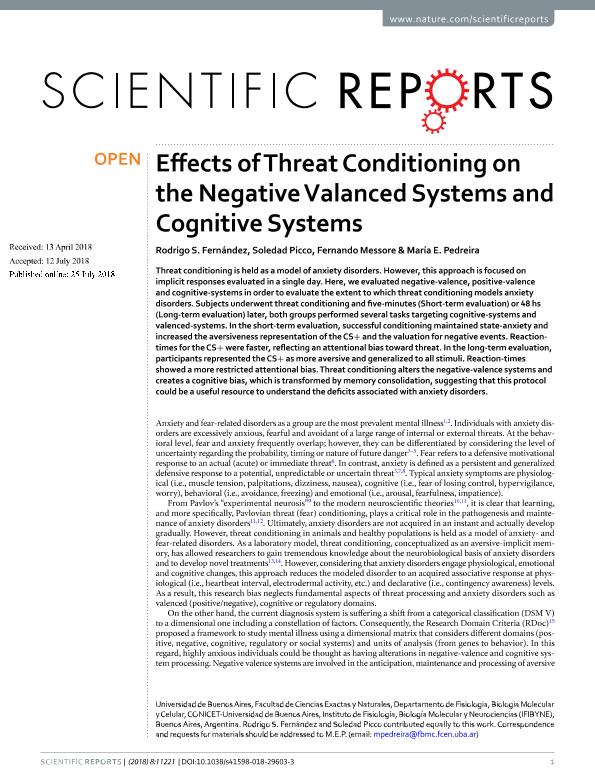Artículo
Effects of Threat Conditioning on the Negative Valanced Systems and Cognitive Systems
Fecha de publicación:
12/2018
Editorial:
Nature Publishing Group
Revista:
Scientific Reports
ISSN:
2045-2322
Idioma:
Inglés
Tipo de recurso:
Artículo publicado
Clasificación temática:
Resumen
Threat conditioning is held as a model of anxiety disorders. However, this approach is focused on implicit responses evaluated in a single day. Here, we evaluated negative-valence, positive-valence and cognitive-systems in order to evaluate the extent to which threat conditioning models anxiety disorders. Subjects underwent threat conditioning and five-minutes (Short-term evaluation) or 48 hs (Long-term evaluation) later, both groups performed several tasks targeting cognitive-systems and valenced-systems. In the short-term evaluation, successful conditioning maintained state-anxiety and increased the aversiveness representation of the CS+ and the valuation for negative events. Reaction-times for the CS+ were faster, reflecting an attentional bias toward threat. In the long-term evaluation, participants represented the CS+ as more aversive and generalized to all stimuli. Reaction-times showed a more restricted attentional bias. Threat conditioning alters the negative-valence systems and creates a cognitive bias, which is transformed by memory consolidation, suggesting that this protocol could be a useful resource to understand the deficits associated with anxiety disorders.
Palabras clave:
Threat Conditioning
,
Anxiety
,
Cognitive systems
,
Cognitivae valence
Archivos asociados
Licencia
Identificadores
Colecciones
Articulos(IFIBYNE)
Articulos de INST.DE FISIOL., BIOL.MOLECULAR Y NEUROCIENCIAS
Articulos de INST.DE FISIOL., BIOL.MOLECULAR Y NEUROCIENCIAS
Citación
Fernández, Rodrigo Sebastián; Picco, Soledad; Messore, Luis Fernando; Pedreira, Maria Eugenia; Effects of Threat Conditioning on the Negative Valanced Systems and Cognitive Systems; Nature Publishing Group; Scientific Reports; 8; 11221; 12-2018; 1-9
Compartir
Altmétricas




